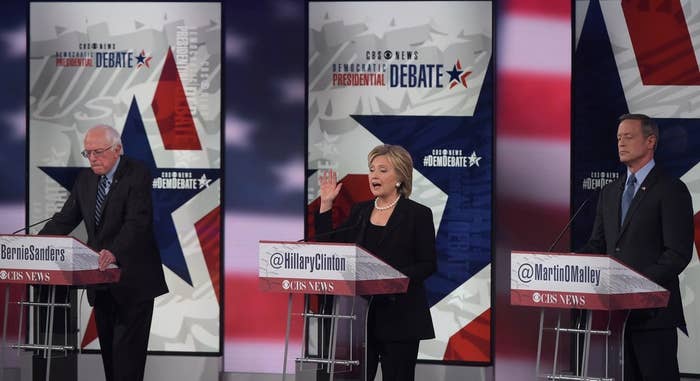
WASHINGTON — The three Democratic campaigns for president jockeying for favor and the attention of the Black Lives Matter movement gathered Thursday for what was expected to be a conversation about engagement.
Instead, no known Black Lives Matter activists attended the event. And one unaffiliated panelist delivered a sharp critique of what the campaigns are doing, and what they could be doing better. Held at by the Washington-based group Democratic GAIN, which seeks to recruit and foster progressive leadership, the event more than anything highlighted a generational tension between Black Lives Matter and the political establishment, whose members routinely offer the same criticism of the activists: that Black Lives Matter isn’t very strategic when it comes to politics.
Yvette Lewis, who appeared on the panel as a surrogate for Martin O’Malley, envisioned a politically perilous scenario for Black Lives Matter: Rev. William Barber II’s “Moral Mondays” protests in North Carolina. For all the attention the protests received, they didn’t translate into much success for Democrats. In 2014, Kay Hagan still lost her U.S. Senate race, and the state's legislature is now majority Republican “for the first time in decades,” she said.
“Marching and protesting is wonderful, we’ve got to have several tracks that we’re operating on at the same time because [North Carolina] lost that Senate seat and there was nothing more powerful than Moral Mondays,” she said.
Other panelists visibly bristled at her assertion.
Lewis, however, told BuzzFeed News the idea of holding candidates accountable through disruption is not what the movement should be primarily focused on.
“You really can look at all of these places where we’ve had a lot of activism and energy, she said. “But if it didn’t translate to the ballot box it doesn’t mean anything because then we still don’t have people in place that will be sympathetic to and further our agenda. That’s what we need. Then once we put them in place we can hold their feet to the fire because we did put them in place.”
A number of people present, however, argued it was the campaigns — not the activists — that could be doing far more to actually work with and engage activists.
Tristan Wilkerson, a political consultant, argued that political organizations and Black Lives Matter aren’t far apart, but the engagement has to look differently than just high-profile meetings, confrontations, and letters back-and-forth.
“We can’t have candidates who just utter ‘black lives matter’ but don’t answer the call to action,” he said, telling BuzzFeed News in an interview that he wasn’t sure the Democratic campaigns understood the appropriate response to the movement in this election cycle. “The response to what Black Lives Matter is demanding can’t be a criminal justice reform plan alone. It has to be engagement on the ground where the people are.”
“If your message is that good, why are you not getting the buy-in on those plans?” he asked. “What there has to be is a recognition of that and an intentional hiring of folks who share these experiences. There needs to be people on the front lines who might have records because they’ve been arrested for protesting. You’re have to bring them in, promote them, and allow them to do the hard work of engaging voters on the issues, but also making sure the candidates understand what the will of the people really is. That is not happening enough.”
The campaigns are watching Black Lives Matter closely while quietly maintaining correspondence with high-profile activists that they do not publicize.
But the two attempts to publicly reconcile some issues between Democrats and Black Lives Matter haven’t quite worked, and may have only further complicated their relationship. When the DNC presented a resolution affirming Black Lives Matter at its summer meeting in Minneapolis, the network quickly slammed it.
And when the Black Lives Matter network called for a debate to press the candidates on issues of import to the movement, the DNC declined, saying it would help the network host a presidential candidates forum. The Black Lives Matter network’s demand to the DNC stands, even as other movement activists try to secure the participation of candidates from both parties in a presidential forum.
Wilkerson, a former Hill staffer and strategist for YI Advisors, alluded to Sanders’ conversations with the rapper Killer Mike, who gave Sanders an endorsement in Atlanta. “That is what engagement looks like. It’s not going to look the same for everybody, but when it comes to fast forwarding movements, it’s just not possible. The candidates have to be willing to risk political capital in order to engage.
“Too often these candidates are overly political,” Wilkerson said. “They want to talk about their record, but they don’t actually want to be the candidate that’s willing to push an aggressive agenda that deals with the consequences of the color line and issues of inequity like Bernie Sanders has done very well.”
Simply proposing platforms is not enough, he said. At least not for Black Lives Matter.
“Movement activists are just not going to buy in,” Wilkerson said. “They’re not going to trust what’s coming out. So you can have a great criminal justice reform plan, but who’s to believe it’s convincing enough? The Koch brothers want criminal justice reforms, too. But does anyone trust that?”
